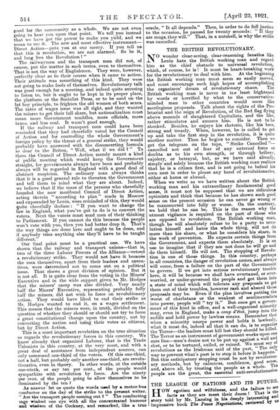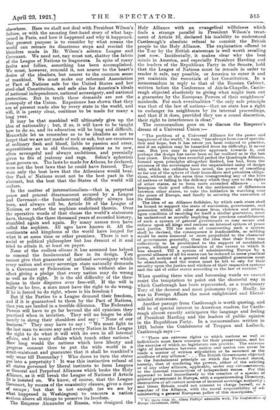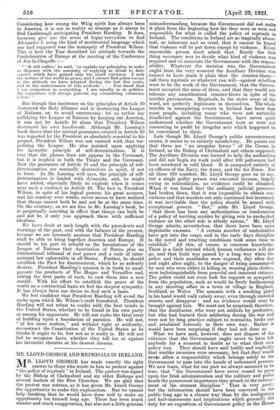THE LEAGUE OF NATIONS AND ITS FUTURE.
HOW egotism and wilfulness, and the failure to see facts as they are meet their doom ! That is the story told by Mr. Lansing in his deeply interesting and impressive book The Peace Negotiations, reviewed by us elsewhere. Here we shall not deal with President Wilson's failure, or with the amazing first-hand story of what hap- pened in Paris, and how it happened and why it happened. Our present purpose is to consider by what means the world can retrace its disastrous steps and rescind the blunders made in Mr. Wilson's solemn League and Covenant. We need not, nay must not, shatter the fabric of the League of Nations to fragments. In spite of many faults and follies, something has been accomplished. We must, however, remould it, not nearer to the heart's desire of the idealists, but nearer to the common sense of mankind. We must make our reformed Association or Pact of Nations safe for the United States and her steel-clad Constitution, and safe also for America's ideals of national independence, national sovereignty, and national protection. But in truth these demands are not the monopoly of the Union. Experience has shown that they are at present made also by every state in the world, and will, it is pretty clear, continue to be made for many a long year. It may be that mankind will ultimately give up the idea of nationality ; but, if so, it will have to be taught how to do so, and its education will be long and difficult. Meanwhile let us remember so to be idealists as not to forget that we are not made of rock or oak, but are creatures of ordinary flesh and blood, liable to passion and error, superstitious as to old theories, suspicious as to new, often revengeful and always ambitious, and perenially given to fits of jealousy and rage. Solon's aphorism must govern us. The laws he made for Athens, he declared, were not the best laws that he could have framed. They were only the best laws that the Athenians would bear. Our Pact of Nations must not be the best pact in the abstract, but the best that the States of the world will endure.
In the matter of internationalism—that is, perpetual peace and general disarmament secured by a League and Covenant—the fundamental difficulty always has been, and always will be, Article 10 of the League of Nations, or rather the sophism enshrined therein. Over the operative words of that clause the world's statesmen have, through the three thousand years of recorded history, stumbled again and again. By many names men have called the sophism. All ages have known it. All the continents and kingdoms of the world have longed for what it at some time or other promises. There is not a social or political philosopher but has dreamt of it and tried to attain it, at least on paper.
None of the endless aliases it has assumed has helped to conceal the fundamental flaw in its design. You cannot give that guarantee of national sovereignty which every nation and every sovereign state naturally demands in a Covenant or Federation or Union without also in effect giving a pledge that every nation may do wrong as well as do right. It is the old difficulty of the theo- logians in their disputes over free-will. If the will is really to be free, a man must have the right to do wrong. If he is forced to do right, where is his freedom ?
But if the Parties to a League demand their freedom, and if it is guaranteed to them by the Pact of Nations, then you are landed in a terrible dilemma. The Federated Powers will have to go far beyond the old cynicism they practised when in isolation. They will no longer be able merely to shrug their shoulders and say : " None of our business." They may have to say : " We must fight to the last man to secure any and every Nation in the League the right to do what it will with its own in all internal affairs, and in many affairs which touch other nations." How long would the nations which love liberty and progress consent thus to put the wide world in a strait-waistcoat and guarantee that it shall be mankind's only wear till Doomsday ? Who dares to turn the status quo into a perpetuity It was this instinctive refusal of all states governed by liberal instincts to form Leagues or General and Perpetual Alliances which broke the Holy Alliance, as it will break the League of Nations if Article 10 is insisted on. We know, of course, that the League Covenant, by means of the unanimity clauses, gives a door of escape ; but that is not enough (as we see by what happened in Washington) to reassure a nation anxious above all things to preserve its freedom. The Emperor Alexander of Russia, who designed the Holy Affiance with an evangelical wilfulness which finds a strange parallel in President Wilson's treat- ment of Article 10, declared his inability to understand Castlereagh's absolute refusal to commit the British people to the Holy Alliance. The explanation offered to the Tsar by the British statesman is well worth recalling just now. Incidentally, it makes clear why the beat minds in America, and especially President Harding and the leaders of the Republican Party in the Senate, hold that the League of Nations must be remade in order to render it safe, nay possible, or America to enter it and yet maintain the essentials of her Constitution. In a memorandum in reply to that of the Russian Cabinet, reagh objected absolutely to giving what might turn out a guarantee by the European Powers of their neighbours' misdeeds. For such eventualities " the only safe principle was that of the law of nations—that no state has a right to endanger its neighbours by its internal proceedings, in is clear. '
The memorandum goes on to discuss the Ensperor's dream of a Universal Union :— " The problem of a Universal Alliance for the peace and happiness of the world," it runs, "has always been one of specula- tion and hope, but it has never yet been reduced to practice, and if an opinion may be hazarded from its difficulty, it never can. But you may in practice approach towards it, and perhaps the design has never been so far realized as in the last four years. During that eventful period the Quadruple Alliance, formed upon principles altogether limited, has had, from the presence of the sovereigns and the unparalleled unity of design with which the cabinets have acted, the power of travelling so far out of the sphere of their immediate and primitive obliga- tions, without at the same time transgressing any of the laws of nations or failing in the delicacy which they owe to the rights of other states, as to form more extended alliances . . . to interpose their good offices for the settlement of differences between other states, to take the initiative in watching over the peace of Europe, and finally in securing the execution of its treaties.
The idea of an Alliance Solidaire, by which each state shall be bound to support the state of succession, government, and possession within all other states from violence and attack, upon condition of receiving for itself a similar guarantee, must be understood as morally implying the previous establishment of such a system of general government as may secure and enforce upon all kings and nations an internal system of peace and justice. Till the mode of constructing such a system shall be devised, the consequence is inadmissible, as nothing would be more immoral or more prejudicial to the character of government generally, than the idea that their force was collectively to be prostituted to the support of established power, without any consideration of the extent to which it was abused. Till a system of administering Europe by a general alliance of all its states can be reduced to some practical form, all notions of a general and unqualified guarantee must be abandoned, and the states must be left to rely for their security upon the justice and wisdom of their respective systems and the aid of other states according to the law of nations."* When quoting these wise and foreseeing words we cannot resist the temptation to point out the shameful way in which Castlereagh has been represented, as a reactionary Tory of the densest and most poisonous type. Really, he was in Foreign Affairs the most enlightened and liberal- minded statesman.
Another passage from Castlereagh is worth quoting, and will be of special interest to American readers, for Castle- reagh almost exactly anticipates the language and feeling. of President Harding and the leaders of public opinion in the Republican Party. In a memorandum written in 1821 before the Conferences of Troppau and Laibach, Castlereagh says :— " There are extreme rights to which nations as well as individuals must have recourse for their preservation, and for the exercise of which no legislature can provide. The extreme right of interference between nation and nation can never be made a matter of written stipulation or be assumed as the attribute of any alliance.' . . . The British Government objected to the fundamental principle on which the Protocol rested, namely, that of rendering the powers, either of the existing or of any other alliance, applicable, under any circumstances, to the internal transactions of independent states. For this appeared to lead immediately to the creation of a species of general government in Europe, with a superintending Directory, destructive of all correct notions of internal sovereign authority ; and Great Britain could not consent to charge herself, as a member of the Alliance, with the moral responsibility of ad- ministering a general European police of this description."
• We quote from Mr. Albion admirable work. The Confederation of Burope (Longman, 1920). written before the onference of Aix-la-Chapelle, Castle- their right to and that if it does, provided they use a soup discretion, Considering how strong the Whig spirit has always been in America, it is not in reality as strange as it seems to find Castlereagh anticipating President Harding. It does, however, give one the sense of topsy-turvydom to find Alexander I. using the kind of sentimental language which one had supposed was the monopoly of President Wilson. This is how the Tsar described his attitude towards the Confederation of Europe at the meeting of the Conference of Aix-la-Chapelle :- " It will suffice,' he said, to explain my principles, in order to dispense with the necessity of replying in detail to false reports which have gained only too much currency. I seek the welfare of the world in peace, and I cannot find peace except in the attitude we have adopted during the last five years, and in the maintenance of this attitude. . . . You know that I am scrupulous in everything. I am equally so in politics. My conscience will always prevent my committing voluntary errors.' " But though this insistence on the principles of Article 10 destroyed the Holy Alliance and is destroying the League of Nations, or, to avoid controversy, let us rather say nullifying the League of Nations by keeping out America, it was not by Article 10 alone that President Wilson destroyed his own handiwork. Although Mr. Lansing's book shows that the mutual guarantee created in Article 10 was regarded by the President as absolutely essential to his project, President Wilson was not content with thus tor- pedoing the League. He also insisted upon applying his favourite principle of self-determination. It is true that .the phrase does not appear in the Covenant, but it is implicit in both the Treaty and the Covenant. Now the guarantee of Article 10 and the principle of self- determination are mutually destructive in spirit, if not in form. As Mr. Lansing well says, the principle of self- determination is loaded with dynamite, and, he might have added, especially likely to explode when it comes near such a contract as Article 10. The fact is, President Wilson, in spite of his logical powers, his great acumen, and his mastery over words, never seems to have realized that things cannot both be and not be at the same time. On the contrary, as we see him in Mr. Lansing's book, he is perpetually asserting in effect that things can both be and not be, if only you approach them with sufficient idealism.
We have dealt at such length with the precedents and warnings of the past, and with the failures of the present, because we are intensely anxious that President Harding shall be able to bring together America and Europe. It should be his part to rebuild on the foundations of the League of Nations that Association of States plus an international tribunal of real power and a code of inter- national law enforceable in all States. Further, he should establish the Pact for disarmament, which he so ardently desires. President Harding's mission is in truth to amal- gamate the products of The Hague and Versailles and, taking the best parts of each, to cast them into a new mould. With his effort to establish the peace of the world on a contractual basis we feel the deepest sympathy. It has always been our desire to find such a basis.
We feel confident that President Harding will avoid the rocks upon which Mr. Wilson's craft foundered. President Harding will not refuse to confer with the best minds in the United States, whether to be found in his own party or among his opponents. He will not make the fatal error of building upon a foundation of paradox. He will not, " of his mere motion," and without right or authority, reconstruct the Constitution of the United States as he thinks it ought to be, but not as it really is. He will not fail to recognize facts, whether they tell for or against his favourite theories or his dearest dreams.




































 Previous page
Previous page